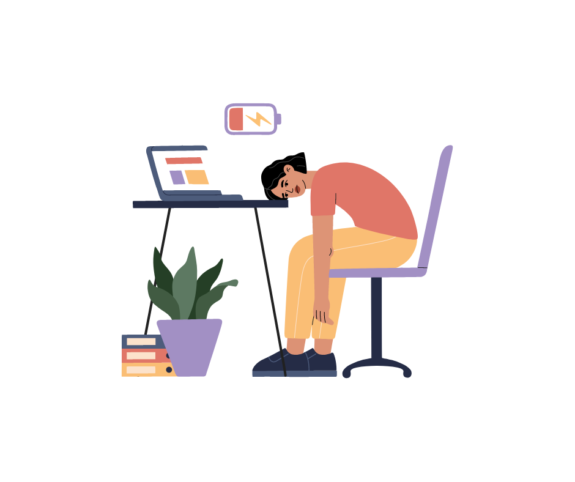It has been a few weeks since New Zealand Prime Minister Jacinda Ardern announced her resignation—a topic that continues to spark conversation and discussions in both politics and, more broadly, in society. This leader admitted that she could no longer perform to the best of her abilities after six demanding years in the position.
Her decision and introspection have made us take some time to reflect that most of us, at some point in our careers, will experience work-related stress that leaves us struggling to cope with the everyday demands of life.
So, in this blog, we’re asking, how do you know when you’re experiencing burnout and what can you do when it happens?
What is burnout?
Burnout is more than a temporary state of feeling low that can be fixed by doing yoga, using a meditation app, or spending a week in the sun.
According to World Health Organisation, burnout is characterised by three core indicators:
- Intense fatigue
- A feeling of detachment
- The cynicism leads to a perception of inefficiency and lack of fulfilment at work.
In modern times, there is a societal expectation to have a great job, a flawless personal image, and to showcase your attributes continuously on social media. It’s no wonder this leads to never-ending comparison and competition. The desire for success and the pressure to have it all are insatiable, and even when achieved, people still seek more.
Add to this the ‘always online’ work and life culture we live in today, and the conditions for burnout are ripe.
Michael Leiter, a professor of organisational psychology at Deakin University, said: “Burnout primarily stems from a disparity between an individual’s preferred way of working and the actual work environment. This disparity can be related to factors such as workload, autonomy, rewards and recognition, social interaction, or fairness and justice in the workplace. When one’s core values are not aligned with their job, such as feeling indifferent or hostile towards it, it can lead to burnout.”
Prevention has a better chance of success than cure.
Leiter says there is a limitation to how much self-care can achieve in our world where some combinations of work and life are difficult to sustain. Nevertheless, he asserts that practising a healthy lifestyle (exercise, nutrition, sleep, and positive relationships) can benefit anyone in any profession.
How you work matters
Importantly, burnout isn’t just about responding negatively to a job; it is often caused by the way work is carried out rather than the job itself.
Bruce Daisley, former VP for Twitter in Europe, author of “The Joy of Work”, and host of the workplace culture podcast “Eat Sleep Work Repeat,” believes that “the more we can distinguish between work time and time to recharge and refresh at home, the better it is for us.”
He also suggests that taking lunch breaks is one way to prevent burnout by improving judgment and energy levels, which helps tackle afternoon tasks.
Burnout signals that your work patterns or environment are unhealthy, and it can be challenging to ask for help. This has to change.
How do we define burnout at Mojo Soup?
One of the key differences between our own definition of burnout and others is the emphasis on three components: physical, emotional, and mental exhaustion, focusing on the feeling of being overwhelmed, emotionally or mentally exhausted and a lack of motivation and engagement. This matters in our business because it relates to our Soupians’ sense of control and ability to manage their workload and responsibilities.
The significance of our definition lies in our ability to help and support our team members in identifying burnout in its early stages. By providing a clear and comprehensive understanding of burnout, we, as a team, can take a proactive approach to prevent and address it.
How we work to prevent burnout
Preventing burnout is our main goal. And sharing workloads is one of the first steps we take, to easily identify over-work and low levels of engagement.
We also:
- Advocate for a healthy work-life balance – we achieve this by allowing our Soupians to flex their schedule to manage life demands.
- Promote healthy habits – we encourage our members to engage in physical activity, eat healthy food, and get enough sleep. Our weekly fruit baskets keep the munchies healthy too.
- Foster a supportive work environment – we create a culture of openness and support in our Five Conversations Framework (FCF) where our team members feel comfortable sharing their concerns and receiving help as needed.
- Manage and monitor workloads – we make sure that workloads are fairly distributed and that our Soupians are not overburdened with excessive responsibilities. We always organise a Monday meeting to encourage delegation and collaboration, ensuring that individual workloads are manageable.
How do you prevent burnout in life and work? Share your best tips in the comments.




